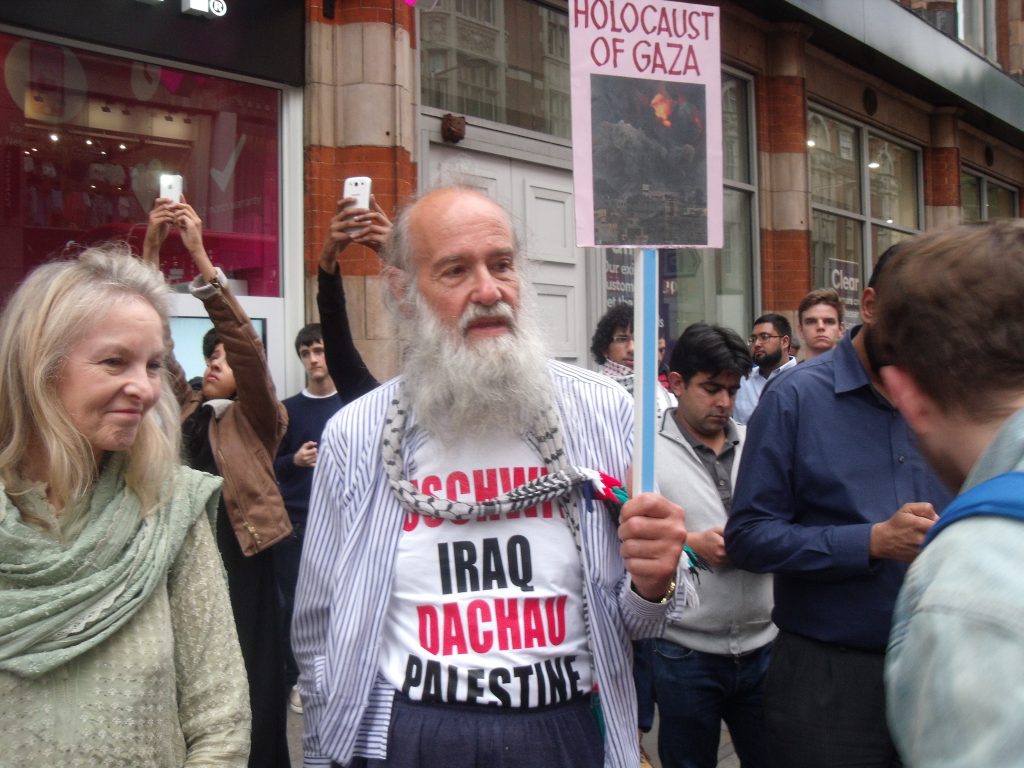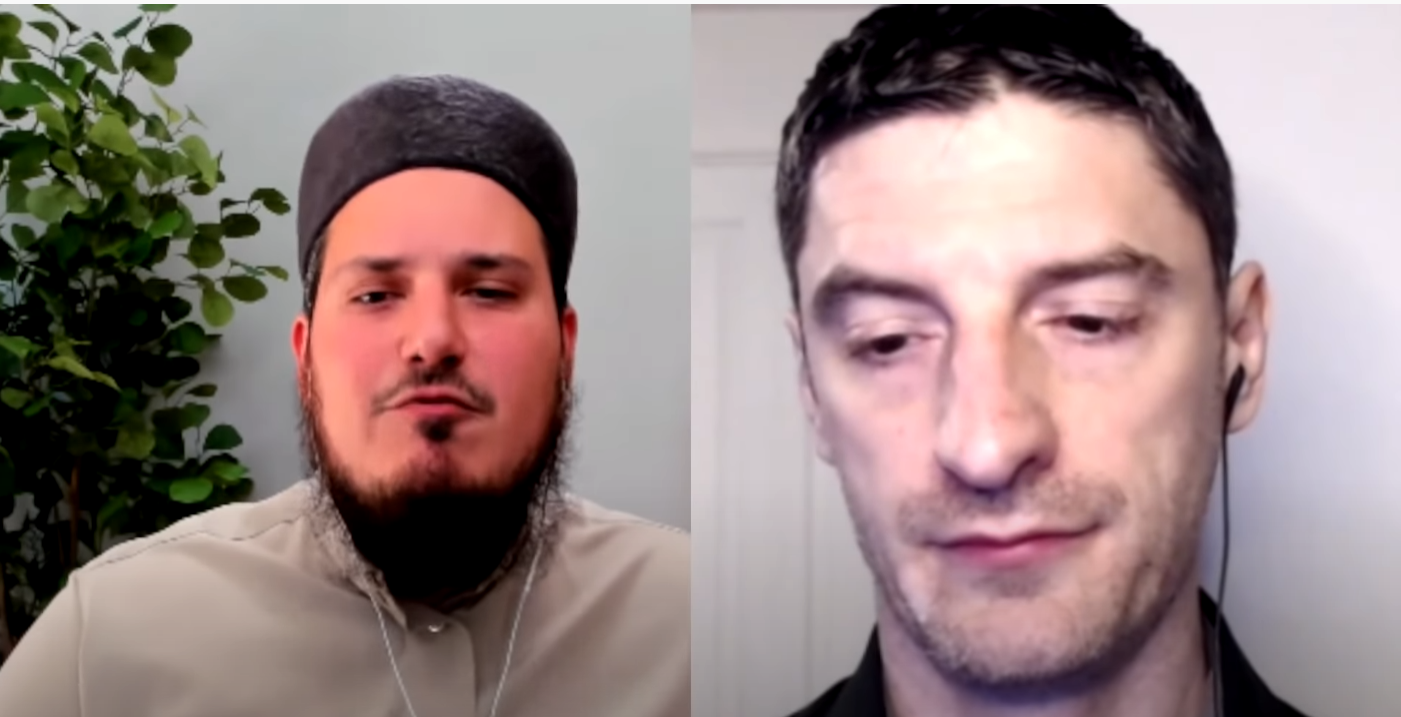Mark Collett is a leading British neo-Nazi. A Holocaust denier, fan of Mein Kampf and a self-avowed “white nationalist,” Mark runs Patriotic Alternative, which British media frequently refers to as “Britain’s fastest-growing far-Right group.”
And then there’s Daniel Haqiqatjou. A hardline American Islamist online preacher, an unabashed supporter of the most gruesome Islamist ideas, and a cheerleader for the Taliban, Daniel enjoys the support of hundreds of thousands of Western Islamists on Facebook and YouTube.
Once living separate lives, the future of both radicals’ extremism, both now seem to realize, may rely on each embracing the other. Swept up in a whirlwind of an immutable, shared fear of Jews, women, homosexuals, democracy and secularism, this has all the elements of a great hate story.
While they may just appear to be online loudmouths, this concord between the two offers a fascinating possible glimpse into the future of ideological extremism across the Western world. Perhaps it was always a matter of time before white nationalists saw Islam not as a threat to their designs, but as a means to impose them.
Understanding Haqiqatjou
Over the past few years, in videos on his YouTube channel, posts on his Facebook account, and hundreds of articles at his online media outlet, Haqiqatjou has made quite a name for himself attacking other Western Islamists for their perceived embrace of “liberalism.”
Groups such as CAIR, leading Salafi clerics such as Omar Suleiman, and legislators such as Ilhan Omar have all been denounced by Haqiqatjou, who accuses them of diluting Islam with “liberalism” and “social justice” by promoting “blasphemy and outright kufr.”
This conflict appears mostly limited to the Islamist world, with ordinary Muslims largely unaware of the endless furor. But Haqiqatjou’s revolt against modernist Islamism’s embrace of progressivism has certainly struck a chord with other, purist-minded Islamists across the West.
The targets of his ire have also noticed. In September 2020, Imam Omar Suleiman publicly apologized for engaging in an “unIslamic ritual” during a progressivist-organized immigration rights march, after Haqiqatjou produced a video and social media campaign that reached hundreds of thousands of Western Muslims.
Meanwhile, Haqiqatjou and his attacks are frequently discussed in a wide variety of Islamist forums and blogs based across the world. As a result, leading prominent clerics are often forced to respond to anger from hordes of online Islamists advancing Haqiqatjou’s accusations and indignation.
Some within the Islamist scene have even termed Haqiqatjou and his ilk as part of a new “akh-Right” – a play on the Arabic word for “brother” and the much-discussed phenomenon of the Western “alt-Right.”
But Haqiqatjou is not just writing angry social media posts in his quest for notoriety. He has spotted an opportunity to confront critics of his strain of Islam directly — organizing half a dozen online debates with a variety of ideological foes, and watched by hundreds of thousands on a variety of platforms.
In doing so, Haqiqatjou claims to be a rare Muslim voice in the West who actively advocates for Islam; in contrast, he claims, to other Muslim leaders, whom he insists have instead “fully adopted feminist liberal interfaith trash” and thus neglected their Islamic duties.
Haqiqatjou’s debates are exhausting, with some going on for over four hours. Moreover, Haqiqatjou always insists on a “post-debate analysis” with his followers – one of which lasted just under nine hours.
Notwithstanding their interminableness, these debates are reliably and steadfastly astonishing, with Haqiqatjou rarely missing an opportunity to reiterate his own radicalism. In a July 2020 debate with ex-Muslim activist Ridvan Aydemir, for instance, Haqiqatjou happily called for the killing of apostates, the stoning of adulterers, and the lashing of fornicators.
The Islamist and the Neo-Nazi
On February 19, one of Haqiqatjou’s debates took quite a turn. In contrast to the usual unrelenting hostility of his encounters, the February debate brought him and his guest together. Islamism and neo-Nazism, it seems, had more in common than both guests anticipated. If the performance of both is to be believed, each seemed as surprised by this realization as the other.
Initially, the debate appeared fractious. Both increasingly spoke over the other. Haqiqatjou appeared convinced that Collett represented the very system of “liberalism” and “Enlightenment” ideas that was corrupting Western Islam; Collett, meanwhile, considered Haqiqatjou too unwilling to accept the iniquitous influence of Jews over Western institutions.
The key turning point came when Collett realized Haqiqatjou also feared the influence of Jews – albeit not quite as strongly — and Haqiqatjou realized Collett did in fact eschew the set of ideas he considers the tenets of “liberalism.” Although Haqiqatjou and Collett never quite solved the chicken or the egg dilemma about which threat appeared first, gradually, both began to comprehend they despised many of the same threats, and shared some similar suggested solutions.
Quickly, Collett and Haqiqatjou began to discover mutual passions. These appeared to include support for the execution of members of the infamous ‘grooming gangs’ in Britain and the establishment of theocracies in both the Middle East and Europe. To the delight of Haqiqatjou, Collett called for the prosecution of British lawmakers who send weapons to kill Muslims at the ostensible “behest” of Zionists.
Much of the remaining disagreement – a mildly shrewd observer with the patience to watch the entire debate will notice – is the product of confusion over terms and historical ideas. Enlightenment, multiculturalism, liberalism, and several important European historical moments, such as the French revolution, are spoken about factlessly and at cross-purposes consistently, for several hours.
But this could not throw the new friendship off-track. As Haqiqatjou noted near the end: “We agreed on liberalism and the Enlightenment, we agreed even on technology. We agreed that there is this ultimate problem of degeneracy in liberalization, we disagree on the cause of that and the origins of that.” Collett agreed, noting the “white nationalists” and “Muslims” were both leading the fight against “usury” and “global capitalism” – and, of course, the Jews.
Haqiqatjou’s hardline Islamist fans – watching live in their thousands – quickly warmed to Collett and his white nationalism, especially when he pronounced: “I’d like to see Islam in the Middle East flourish and have the foot of Zionism taken off its neck.”
Collett added: “I want you guys to have Islamic rule. … I want the Shiite Muslims who live in Syria to take power into their hands. And if they want a theocracy and an Islamic theocracy, they should be allowed to have that, and good for them.”
As it became clear that Collett sought to destroy the same system of individual liberty and secularism despised by Islamists, hundreds of commentators praised Mark and declared the event the beginnings of a new alliance.
Some – both Islamist and far-Right followers of Collett – encouraged Haqiqatjou to invite other “white nationalist” guests, such as the Holocaust denier Ryan Dawson and the American far-Right leader Nick Fuentes.
Collett reiterated that “I am not against Islam and I do believe Islam has a place in the world.” He complained that too many people conflate him and his followers with the “anti-jihad movement.” He denounced members of this “anti-jihad” movement as “Jews”, “lesbians” and supporters of “liberalism” and “Zionism.”
Collett found a new following on February 19. And hundreds of the Islamists watching praised Collett as “one of us,” and “one step away from being a Muslim so far.” And indeed, Haqiqatjou and the viewers were quick to call Collett to Islam.
In response, the white nationalist said that while he was Christian for the moment, he “would be happy to read the Quran and I’m always happy to go into things with an open mind.”
Most extraordinarily, Collett, the leader of Britain’s fastest growing far-Right movement, also declared he could “concede” being part of an Islamic white ethnostate in Europe.
And so there is the nub of it. Collett the white nationalist would apparently not mind an Islamic theocracy in Europe, so long as it is a “white ethnostate.” Haqiqatjou the Islamist, meanwhile, seemed unfazed by the idea of a white ethnostate in Europe, so long as it is Islamic.
The Future of Islamism and the Far-Right
In the past, there have been harbingers of far-Right collaboration with Islamism.
In 2004, Daniel Pipes revealed that the inaugural ‘Reviving the Islamic Spirit’ conference in Toronto – organized and attended by terror-linked activists and groups – featured the neo-Nazi activist William W. Baker.
Daniel Greenfield, meanwhile, has revealed ties between a member of the Council on American-Islamic Relations (CAIR) and American neo-Nazi organizations. MEMRI has noted strong support for Islamist terror groups in neo-Nazi circles.
Indeed, Collett himself noted during his debate with Haqiqatjou that he had “done full afternoon discussions with Muslims in Syria, where they’ve agreed with me and I’ve agreed with them. And we both said that together, as white nationalists and as Syrian Muslims, we want to stand united against … Zionist power.”
Over the past decade, across Europe, meanwhile, far-Right politicians have grown increasingly close with the Assad regime and its Islamist backers in Tehran.
The French far-Right has enjoyed close contact with Iranian regime Islamists. The notorious anti-Jewish French comedian Dieudonne M’bala M’bala – who popularized the quenelle, an inverted Nazi salute – spends his time off-stage expressing support for both jihadists and the far-Right.
And in 2014, I noted the involvement of leading British Holocaust deniers and neo-Nazis at anti-Jewish events organized by Hamas and Jamaat-e-Islami Islamist groups in the United Kingdom.

Separately, there have also been milder expressions of a rejection of progressivism and an embrace of the Right by Muslim activists more generally. Ismail Royer, for instance, is a former jihadist who works for the multi-faith Religious Freedom Institute in D.C. He firmly rejects progressivism, and today urges an Islamic alliance with conservative Christian movements.
Similarly, the black Muslim leader Abdullah bin Hamid Ali – an interesting thinker who has for many years been found on the edges of various Islamist networks – has repeatedly urged American Muslims to rethink their political approach, suggesting in 2020 a “new political vision” that rejected “neoliberalism.” Today, Ali’s Twitter feed contains a startling array of Tucker Carlson clips and comments about the follies of anti-capitalist and anti-racist protest movements.
However, these gentler examples are just evidence of a more general growing Muslim dissatisfaction with the Islamist embrace of progressivism.
That some Islamists among the discontented are starting to move all the way towards bona fide neo-Nazis and white nationalists is evidence of a far more important shift. And in some ways – given the venom towards Jews, women, homosexuals, capitalism and democracy espoused by so many Islamist and “white nationalist” networks in the West – it is curious that such an alliance was not established long ago.

Then again, many Islamist networks in the West have been primarily led by a media-savvy, educated middle-class – much of it emerging from the Muslim Brotherhood networks emigrating from the Arab world – who possessed the political wherewithal to realize that inching closer to the progressivists would afford them access to real political power. A ragtag bunch of heavily tattooed neo-Nazis could not offer them the same opportunities.
But if the cost of that access, the growing “akh-Right” Islamist movement realizes, is the dilution of Islam, then it may be too heavy a price to pay.
It was perhaps, then, inevitable that angry online preachers such as Daniel Haqiqatjou (and a dozen other similar voices with hundreds of thousands of followers) are establishing a firm base of support. It is also perhaps inevitable that these new Islamist networks would eventually align themselves with very radicals that earlier generations of Islamists had rejected as inadequate.
Reflecting on the evolution of Islamist ideologies in the West, it remains deeply curious that these battles within Islamism are firmly non-religious. Most of the intra-Islamist arguments, alliances and enmities revolve not around some school of jurisprudence or theology, but around Western political concepts. Few fatwas or other religious ruling on these questions can be found.
Haqiqatjou and his allies, as well as the targets of his fury, such as Omar Suleiman and groups such as CAIR, may mostly claim to desire the Islam of the East; but almost everything they do to advance these ideals is examined and carried out through the politics of the West.
As these new Western Islamist ideologues and their networks continue to develop their own strains of Islamism – gradually detaching from their Middle Eastern and South Asian ideological origins – the prospect of wholesale confluence with both the far-right and far-left in Europe and America becomes more and more likely. After all, it is with these Western political extremes that growing numbers of Western Islamists now have more in common politically than their non-Western religious brethren.
From the perspective of counter-Islamists and our reformist Muslim allies, in some ways, this may not be such bad news. It’ll certainly be easier to persuade fecklessly-subjective newspaper editors and tiresomely-cautious politicians to write and warn about the threat of Islamism if it is locked in a neo-Nazi embrace.
Full Debate Video:
Full Transcript:
